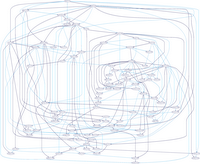 More specifically - Why does divided government work to limit the growth of government spending? By exactly what specific mechanism does divided government accomplish this minor miracle?
More specifically - Why does divided government work to limit the growth of government spending? By exactly what specific mechanism does divided government accomplish this minor miracle?The answer: I don't have a f**king clue how or why it works.
The point: I don't need to understand how or why it works to know that it does work to restrain spending. Just as I don't need to understand that two protons react to form deuterium plus a positron and a neutrino to create the energy from the sun, in order to know that if I don't wear some sunscreen at the beach, I am going to get burned. One is theory, the other is empirical experience.
In scientific methodology, there is theory, and there is experimental/empirical evidence based on observation. Theories are proposed to explain the empirical evidence that experiments observe. Theories can be found to be right or wrong explaining the empirical evidence. But if the theory is shown to be false, it does not change the fact, that the empirical evidence is true.
That divided government restrains spending is a historical, empirical fact, as documented by William Niskanen and others.
We can act (vote) on that known fact.
Critics of the divided government voting strategy seem to want to argue about theories of the mechanism of how and why it works. They will attack the strategy by saying divided government does not work to restrain spending because [fill in the blank]. Example:
"The gridlock theory assumes that Republicans will hold back the proclivity to spend more on the part of the Democrats. That is already happening and I doubt it would be much better with the Republicans not in power. I’ll put it another way, inspead of x the Republicans want x+2 and the Democrats want x+3. My guess is we will get x+2 in the gridlock case which is what we would get now.... "- Lance commenting on the QandO blog
Scholars write dissertations and books on the subject of divided government and how policy is developed under divided and unified governments in the United States. It is all very interesting, and there many conflicting theories to be found in this scholarship about why and how decisions are made. This linked site, highlights research applying statistical analysis and data mining techniques to the congressional voting record, all in the service of shedding some light on why congress does what it does.
I have no doubt that somewhere in all of this scholarship, there is to be found a great theory which explains in detail why divided government has historically resulted in restrained spending growth. Personally, I subscribe to the "causal model of influence" theory illustrated by this "belief net" graphic based on the 2003 Senate voting record. Click on the graphic to review a full size version.
 The meaning of this graphic is intuitively obvious to the casual observer, so no additional comment is required. But I digress ...
The meaning of this graphic is intuitively obvious to the casual observer, so no additional comment is required. But I digress ...Regardless whether you believe the theory that the sun's rays are generated from nuclear fusion, or whether you believe (as I do) that the sun's rays are generated by Apollo's flaming chariot as he makes his daily ride across the sky, you are still going to burn if you don't wear sunscreen.
And regardless of whether a divided government restrains spending through gridlock, or whether it is a result of some other mechanism, we will all still be burned if we continue with single party control in Washington.
Just Vote Divided.


No comments:
Post a Comment